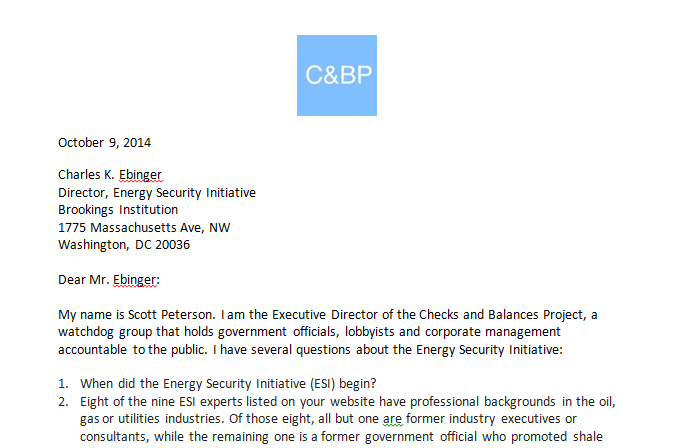A front-page story in The Washington Post today states that the Brookings Institution “has grown more reliant on corporations, wealthy individuals and foreign entities,” and that “number of recent Brookings studies have been singled out for criticism by academics and others, some of whom attribute the research results to Brookings’s association with corporate donors and other wealthy interests.”
In a letter of inquiry to the Brookings Institution’s Energy Security Initiative (ESI) Director Charles K. Ebinger on Oct. 9, the Checks and Balances Project asked several pertinent questions. We have yet to receive a reply to that letter, but the Post’s article seems to confirm several of our concerns. The letter is attached to this post.
Eight of the nine experts listed on the ESI website have professional backgrounds in the oil, gas or utilities industries. Of those eight, all but one are former industry executives or consultants, while the remaining one is a former government official who promoted shale oil.
Certain Brookings fellows seem to be misinformed about renewable energy. Amory B. Lovins, Chief Scientist at Rocky Mountain Institute, wrote that Charles R. Frank, Jr., whom Brookings describes as “a nonresident senior fellow,” wrote in a working paper published in May “that new wind and solar power are the least, and new nuclear power and combined-cycle gas generation are the most, cost-effective ways to displace coal-fired power—just the opposite of what you’d expect from observing market prices and choices.” Today’s investigation by the Post underlines my concerns by stating that, “Energy companies have escalated their giving to Brookings in recent years, and its Energy Security Initiative has built a team of experts made up in large part of individuals with oil and utility industry ties.”
A chart included with the article shows that Xcoal Energy & Resources, Shell, Statoil, Chevron, and ExxonMobil all donated at least $100,000 each to Brookings in 2013. In addition, several oil-rich countries such as Qatar and the United Arab Emirates have donated at least $500,000 each to Brookings.
Lovins noted that by simply updating “the nine most egregiously outdated figures” in Frank’s analysis for Brookings, the rankings would be reversed, with renewable energy offering more net benefits than the other sources. Unfortunately, Brookings’ venerable reputation meant that their misinformed analysis was nonetheless amplified by The Economist.
In January 2013, Director Ebinger, who has “served on the boards of oil and gas companies” according to his biography, called on “pusillanimous” government officials to “stand up” to the renewable energy industry, while making no mention of the incentives that other energy sources receive.
Ebinger, in his own writings at Brookings, misses the cost savings that renewable energy provides to consumers, both on their electric bills and in avoiding costly health impacts; and how rapidly it is expected to shoulder the majority of America’s energy needs as its cost plummets.
The Brookings Institution has been considered a pillar of establishment thought-leadership. That’s why the Post’s investigation, and Brooking’s lack of a response to my letter is so disturbing.
Scott Peterson
Executive Director
The Checks and Balances Project







Recent Comments